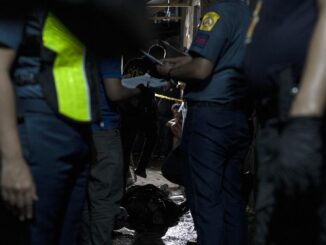
MANILA, Philippines — Sen. Bong Go, chairman of the Senate committee on health and demography, has continued his feeding initiatives in hospitals and Malasakit Centers to address the broader needs of Filipino families, especially to support Severe Tropical Storm Kristine victims.
Since the Malasakit Centers Act was enacted, over 15 million Filipinos have been able to access vital medical aid for health care services.
“In difficult times, ensuring families have meals can make all the difference. This is malasakit in action, providing for immediate needs so families can focus on recovery and healing,” Go said.
From Oct. 25 to 30, the Malasakit Team distributed meals in hospitals across the country, including areas affected Kristine such as the Amang Rodriguez Memorial Medical Center in Marikina City; San Lazaro Hospital and Tondo Medical Center in Manila City; Research Institute for Tropical Medicine in Muntinlupa City; Novaliches District Hospital in Quezon City; Dr. Jose N. Rodriguez Memorial Hospital in Caloocan City and Navotas District Hospital in Navotas City.
In other parts of Luzon, there were also meals served at Quezon Medical Center in Lucena and Maria Eleazar Estrella Hospital in Tagkawayan in Quezon; Antipolo City Hospital System Annex IV in Antipolo City and Casimiro A. Ynares Memorial Hospital in Montalban in Rizal; Camarines Norte Provincial Hospital in Daet, Camarines Norte.
Go’s Malasakit Team also provided meals at Southern Philippines Medical Center in Davao City and Palo Schistosomias Hospital in Palo, Leyte, which helped alleviate the burden of hunger for those already struggling with medical and financial challenges.
Through partnerships with local government units and private organizations, Go is pushing to sustain and expand these feeding initiatives so that more families can benefit, particularly those impacted by Kristine.
“This effort is more than a temporary solution; it’s about making feeding programs a permanent part of our health care support system,” he added.
Go also underscored the importance of strengthening disaster resilience and recovery systems, highlighting his proposed Senate Bill No. 188, which advocates for the establishment of a Department of Disaster Resilience (DDR).
This proposed department, intended to operate at the Cabinet level, would adopt a comprehensive approach to disaster preparedness. According to Go, the DDR should prioritize three key areas: disaster risk reduction, preparedness and responsive action, and the recovery phase should focus on restoring normalcy and rebuilding with improved resilience.





Be the first to comment